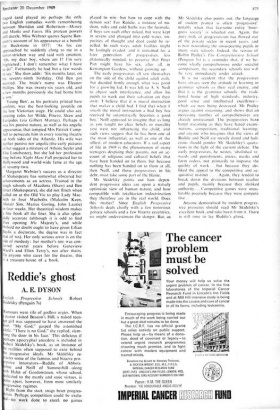Reddie's ghost
A. E. DYSON
nglish Progressive Schools Robert kidelsky (Penguin 7s) amours were rife of godless orgies. When pastor visited Beacon's Hill, a naked teen- ge girl was supposed to have answered the oor. "My God," gasped the astonished eric. "There is no God," she replied, slam- mg the door in his face.' This delicious if • rhaps apocryphal anecdote is included in obert Skidelsky's book, as an instance of e realities often supposed to exist behind e progressive ideals. Mr Skidelsky re- eates some of the famous and bizarre pro- essive innovators—Reddie of Abbots- °line and Neill of Summerhill—along ith Hahn of Gordonstoun, whose school, dicated to the manly and stoic virtues, is es apart, however, from most similarly rogressive regimes. Right from the start, snags beset progres- vism. Perhaps competition could be exclu- -no work done to excel, no games played to win—but how to cope with the demon sex? For Reddie, a mixture of nu- dism, rules and cold baths was the formula; if boys saw each other naked, but were kept in sevens and plunged into cold water, im- purities of thought and deed could be re- pelled. In such ways, adult frailties might be lastingly evaded: and it remained for a later generation of progressives, less platonically minded, to perceive that Peter Pan might have his sex, after all. in Kensington Gardens, without growing up.
The early progressives all saw themselves on the side of the child against adult evils, but decided firmly enough what was good for a growing lad. It was left to A. S. Neill to abjure such interference, and allow his pupils to work out their salvation on their own: 'I believe that it is moral instruction that makes a child bad. I find that when I smash the moral instruction a bad boy has received he automatically becomes a good boy.' Neill appeared to imagine that as long as you taught no clear beliefs or morality you were not influencing the child; and such views suggest that he has been one of the most influential, as well as one of the silliest, of modern educators. If a sad aspect of life in 1969 is the phenomenon of many teenagers despising their parents, not on ac- count of religious and cultural beliefs that have been handed on to them, but because nothing has been handed on to them at all, then Neill, and those progressives in his debt, must take some part of the blame.
Mr Skidelsky points out how depen- dent progressive ideas are upon a naïvely optimistic view of human nature, and how compatible with totalitarian indoctrination they therefore are in the real world. Does this matter? Since English Progressive Schools deals chiefly with a few notorious private schools and a few bizarre eccentrics, we might underestimate the danger. But, as Mr Skidelsky also points out, the language of student protest is often 'progressiv& notably when that fearsome entity 'bour- geois society' is wheeled out. Again, the pure milk of progressivism has flowed out of the private sector in recent years. and is now nourishing the unsuspecting pupils in many state schools. Indeed, the reissue of Robin Pedley's The Comprehensive School (Penguin Ss) is a reminder that, if we be- come wholly comprehensive under socialist compulsion, the secondary schools too will be very immediately under attack.
It is no accident that the progressives have always seen the attitude to learning in grammar schools as their real enemy, and that it is the grammar schools—the tradi- tional home of high standards, industry, good sense and intellectual excellence— which are now being destroyed. Mr Pedley argues against streaming. and shows that an increasing number of comprehensives are already unst reamed. The progressives have hated streaming as they have hated exami- nations, competition, traditional learning; and anyone who imagines that the views of Reddie and Neill are merely dated and ludi- crous should ponder Mr Skidelsky's quota- tions in the light of the current debate. The early progressives, he writes, 'abolished re- wards and punishments, prizes, marks and form orders, not primarily to improve the quality of work ... but because they dis- liked the appeal to the competitive and ac- quisitive instinct . . . Again, they tended to break down the divisions between teacher and pupils, mainly because they disliked authority ...Competitive games were unpa- latable precisely because they were competi- tive ..
Anyone demoralised by modern progres- sive pressures should read Mr Skidelsky's excellent book, and take heart from it. There is still time to lay Reddie's ghost.


































 Previous page
Previous page